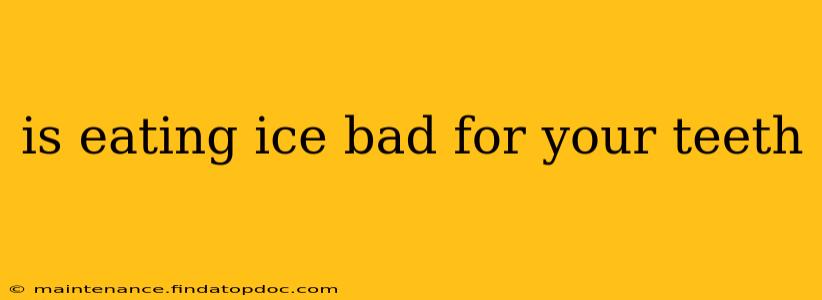We all know that sugary treats can wreak havoc on our pearly whites, but what about something seemingly innocuous like ice? While a refreshing ice cube on a hot day might seem harmless, the truth is that habitually chewing on ice can be detrimental to your dental health. This article delves into the potential dangers of ice chewing and offers helpful advice on protecting your teeth.
Can Chewing Ice Damage Your Teeth?
Yes, chewing ice can absolutely damage your teeth. The hardness of ice creates significant stress on your enamel, the hard outer layer protecting your teeth. Repeatedly crunching on ice can lead to:
- Cracked or chipped teeth: The force exerted on your teeth while chewing ice can cause microfractures that, over time, can develop into visible cracks or chips.
- Enamel erosion: The abrasive nature of ice wears away the enamel, making your teeth more susceptible to cavities and sensitivity.
- Increased tooth sensitivity: Once the enamel is weakened or eroded, the underlying dentin (a softer layer) is exposed, leading to increased sensitivity to hot, cold, sweet, and sour foods and drinks.
What Happens if You Crack a Tooth from Chewing Ice?
Cracking a tooth from chewing ice, even a small fracture, is a serious matter requiring immediate dental attention. Ignoring a cracked tooth can lead to:
- Severe pain: The crack can expose the nerve, causing significant pain and discomfort.
- Infection: Bacteria can enter the crack, leading to an infection of the tooth's pulp (the inner part containing nerves and blood vessels).
- Tooth loss: In severe cases, a cracked tooth may need to be extracted to prevent further complications.
How Does Chewing Ice Affect Enamel?
As mentioned earlier, chewing ice is abrasive and directly contributes to enamel erosion. Enamel is the strongest substance in the human body, but it's not indestructible. The constant friction from ice chips weakens and wears down the enamel, leaving your teeth vulnerable to decay and damage.
Is It Bad to Chew on Ice Cubes Every Day?
Daily chewing on ice cubes significantly increases the risk of dental problems. The cumulative effect of the abrasive action on your enamel over time is far more damaging than occasional ice consumption.
How Can I Stop Chewing Ice?
Breaking the habit of chewing ice can be challenging, but it's crucial for your dental health. Here are some helpful strategies:
- Identify your triggers: What situations or emotions lead you to chew ice? Addressing the underlying reasons can help you break the habit.
- Find healthy alternatives: Satisfy your need for a cold sensation with ice water, frozen fruit, or sugar-free popsicles.
- Be mindful: Pay attention to when you're putting ice in your mouth. Becoming aware of the habit is the first step towards breaking it.
- Seek professional help: If you're struggling to stop on your own, consider seeking help from a dentist or therapist. They can offer additional support and strategies.
Conclusion: Protecting Your Smile
While the occasional accidental bite of ice is unlikely to cause significant harm, habitually chewing on ice puts your teeth at serious risk. Protecting your smile involves making conscious choices, and avoiding this potentially damaging habit is a significant step towards maintaining optimal oral health. If you experience any tooth pain or sensitivity, consult your dentist immediately. Regular dental checkups are also crucial for early detection and prevention of any dental issues.
